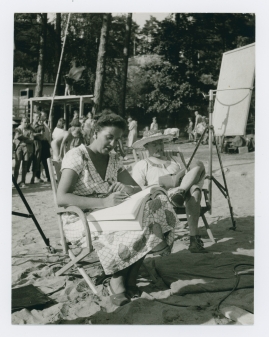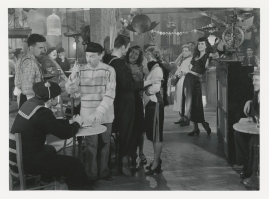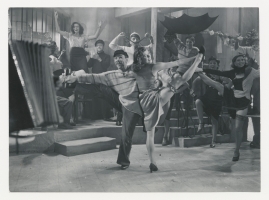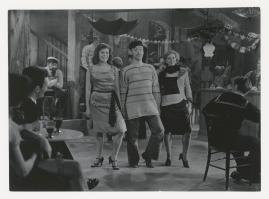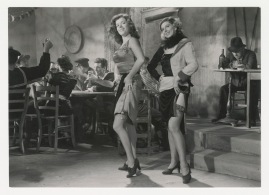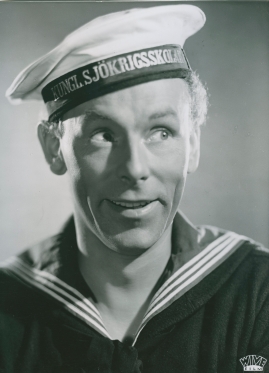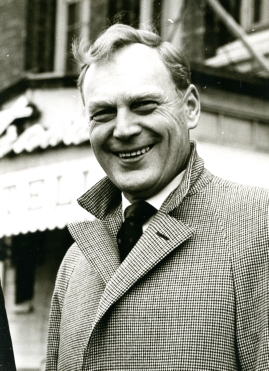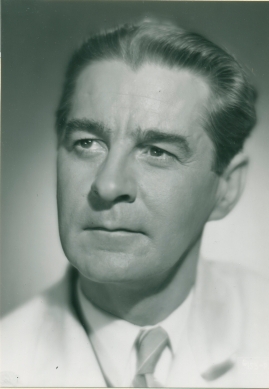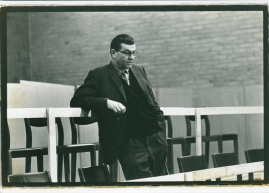Barbro Boman
Table of contents
- Basic facts
- Links and resources
- Biography
- Awards
- Films
- Original work
- Soundtrack listing
- Groups
Basic facts
Media (5)
| Alternative names |
|
|---|---|
| Director | |
| Screenplay | |
| Show all films |
Biography
Swedish director, scriptwriter, actress and script supervisor. Born as Barbro Breithaupt Meyer in Göteborg.-Barbro Boman's 1956 directorial debut with Det är aldrig för sent ('It's Never Too Late') was not simply a trend-breaking moment in a male-dominated world: it was also something of a major personal slice of revenge for what had been an initially unsuccessful career in the film industry some 15 years earlier. Having graduated from high school in Göteborg and periods spent at the Sorbonne and in Granada, Boman made her way to Stockholm in...
Links and resources
Biography
Swedish director, scriptwriter, actress and script supervisor. Born as Barbro Breithaupt Meyer in Göteborg.
-
Barbro Boman's 1956 directorial debut with Det är aldrig för sent ('It's Never Too Late') was not simply a trend-breaking moment in a male-dominated world: it was also something of a major personal slice of revenge for what had been an initially unsuccessful career in the film industry some 15 years earlier. Having graduated from high school in Göteborg and periods spent at the Sorbonne and in Granada, Boman made her way to Stockholm in the early 1940s in search of a job. She became a script supervisor at the Sandrews studios, but only lasted for one film. This was unsurprising, given her own judgement on her efforts: "I was the most talentless script supervisor in the whole world," as she put it in a newspaper interview. Sandrews and Boman terminated her employment by mutual consent, and she moved to the northern Swedish town of Östersund where she got married and started a family.
But she never relinquished contact with the film industry, and having sold a couple of screenplays which never made it to the screen, in 1948 she was back with a job at the SF studios at Stockholm's Filmstaden as a script reader and head of advertising. During this time she also directed a number of commercial films and played a small part in Customs Officer Bom (Tull-Bom, Lars-Eric Kjellgren, 1951). Around the same time she saw the American short Angry Boy (Alexander Hammid, 1950), an educational film about children with learning disabilities. The film was a something of an eye-opener for Boman, who abandoned her acting ambitions and decided to become a filmmaker with the aim of making similar films to the one she'd just seen. Her desire to educate is a recurring feature of her filmmaking, irrespective of whether this applies to feature films or the documentary shorts she made in Denmark. It appears quite clearly in the script she wrote about the then highly topical facility Barnbyn Skå ('The Children's Village Skå'), where children with various kinds of psychological and social problems lived and were treated. The upshot was a well-received film, Vägen genom Skå ('The Route Through Skå,' Hans Dahlin, 1957), in which she make a clear case for the more gentle forms of treatment that Skå represented compared to more traditional institutions.
In her partly autobiographical It's Never Too Late the plot centres on Görel Rocke, a woman in the throes of a troubled marriage who attempts to break out of her corrupt and rigid upper class environment. Boman, whose parents were also divorced, grew up in such an environment. Her father, whom she rarely got to see, was something of an exotic figure, a British major and lion hunter in Africa. Like Boman in real life, her main character's marriage is on its way to the same breakup as that of her parents. But one day when is on a visit to her embittered mother, memories of her childhood are brought to life and she starts to re-evaluate her decision. The film was generally well received by the Swedish critics, despite the fact that much of their focus lay on the fact that it was a film made by a woman, about a woman and for women. As the critic of the women's magazine put it: "Anyone who is not a woman need not bother to go and see it." Viewers today are unlikely to regard it as a film solely for women and should appreciate its more generally applicable message.
Towards the end of the 1950s Boman moved to Copenhagen where she worked in the theatre and also made films about the Danish childcare system. In 1961 she was back on the Swedish film scene with her feature film The Flamboyant Sex (Svenska flickor i Paris). In it she took up the problem of naïve young Swedish girls who moved to Paris with all manner of unrealistic dreams. Following its premiere in Stockholm, the film was totally panned by the critics, and Bo Widerberg wrote that: "almost in its entirety, the film is a wretched affair". It was made in collaboration with Peter Weiss. In the film's opening credits there is no mention of a director, but in the reviews it was stated that Boman had directed the actors and Weiss had been in charge of the cinematography, yet Weiss subsequently toned down his involvement. He insisted that he had only been involved as an editor and that he had contributed to some of the images. Not only that, he had left the production before it was finished because of differences of opinion. Boman, who had written the screenplay, is now acknowledged to be the most important originator of the film, even though she claimed that Weiss had been considerably more involved in the film than he himself was willing to admit. She too was subsequently dissatisfied with the film, but unfortunately she never got the chance to redeem herself.
Although she is only credited as the director of two feature films, there is no doubt that Barbro Boman is an important name in Swedish film history and that she was one of the female pioneers who drove the art of film forwards. It is a pity that she did not get more chances to show it.
Martin Ohlsson (2013)
(translated by Derek Jones)
Films
| Director |
|
|---|---|
| Screenplay |
|
| Cast |
|
| Compilation |
|
| Script Supervisor |
|
Soundtrack listing
| Singer |
|---|
